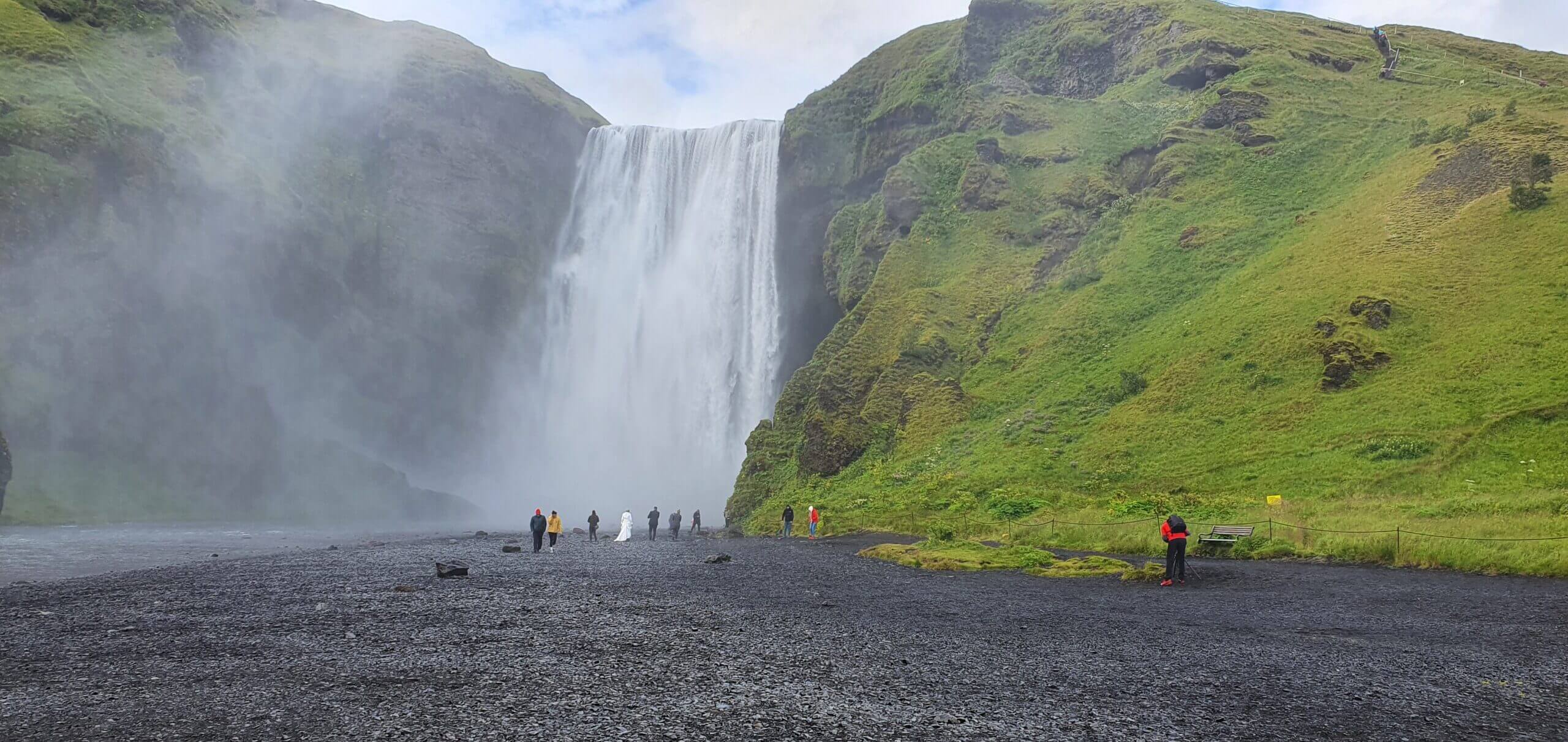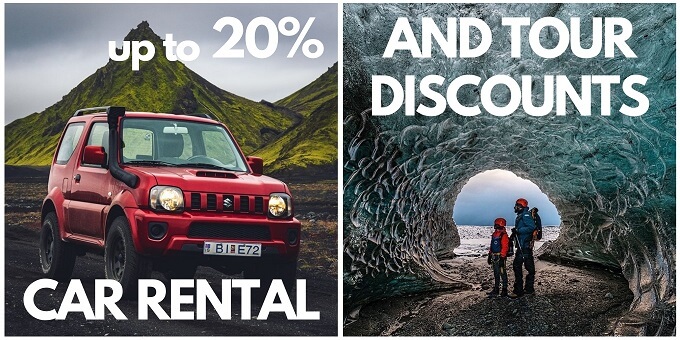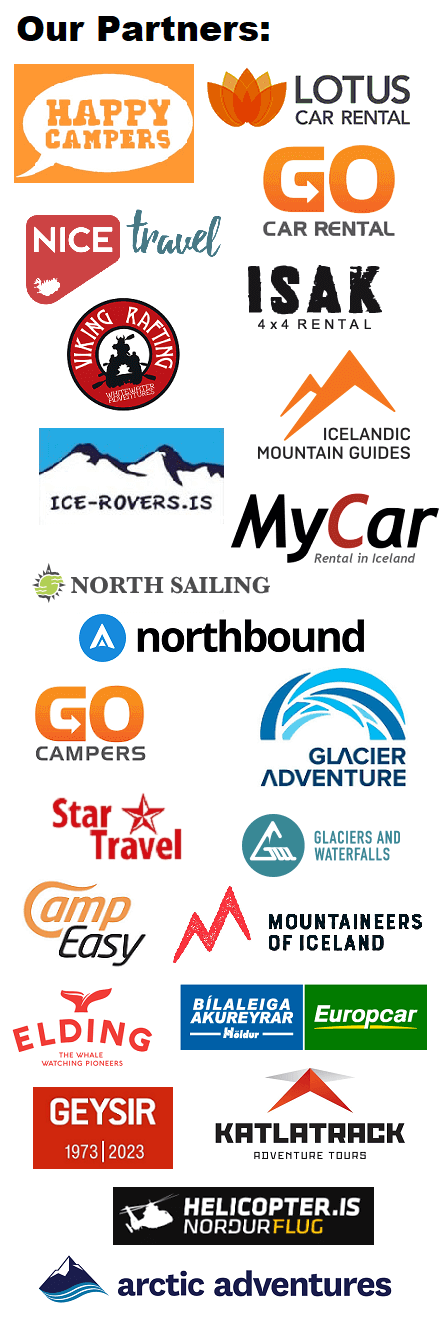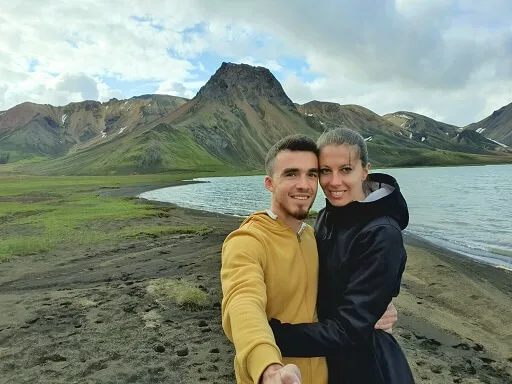Contents
Reykjavik
7:00-13:00
We decided to begin our second day with a visit to probably the most famous Icelandic museum – the Icelandic Phallological Museum. But the museum was open only from 10 am, so we firstly visited Reykjavik campsite.
Why visit the Reykjavik campsite? Because you can make use of tons of things travellers are leaving there when departing from Iceland (e.g. half-empty gas canisters) – at least that’s what we were told. Things were a little bit different during “covid times” as the campsite on the day of our visit (2.8.2020) was just starting to implement new measures for social distancing. This even resulted in the camp being closed for that day. In reality, this, together with a significantly lower number of tourists, meant that things left for sharing in the campsite were scarce and the campsite was not worth the visit this time. Under different circumstances, it may be worth it, however.
We quickly left and spent the rest of the time until the museum was open doing food shopping to prepare for the next 3-4 days in the nearby Krónan chain, which was said to be cheap (well, nothing is actually really cheap here in Iceland, but you must have read that everywhere already).
Icelandic Phallological Museum
10:15-11:30
Distance from car park: 3-10 minutes (depends where do you leave your car) Time spent at: 60-90 minutes (depends on your affection towards phalluses) Worth visiting even with bad weather: yes Physical condition needed: little Interesting index: 2 – great (1-amazing, 2-great, 3-nice)
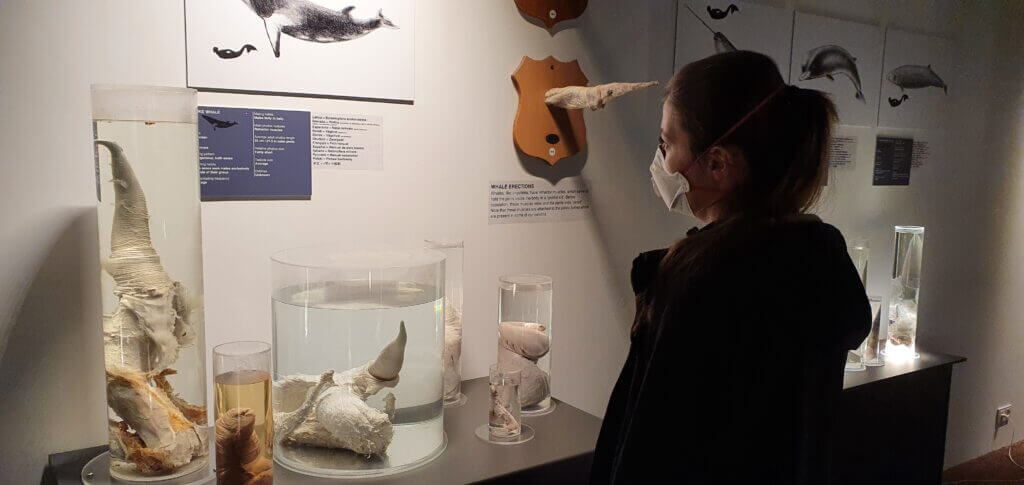
Reykjavik phallological museum, during Covid-19 pandemic
Icelandic phallological museum is really unique and funny, that’s why we opted for a visit despite not planning to go to museums. The ticket costs 2200 ISK (14Eur, 16 Usd) and especially because of its uniqueness we think it’s worth it. We came for the opening hours and during Covid times there were around 10 other visitors. You can find information about parking in Reykjavik here.
Kleifarvatn lake
13:00-13:15
Distance from car park: 0 minutes Time spent at: 5-20 minutes Worth visiting even with bad weather: yes, probably Physical condition needed: little Interesting index: 3 – nice (1-amazing, 2-great, 3-nice)
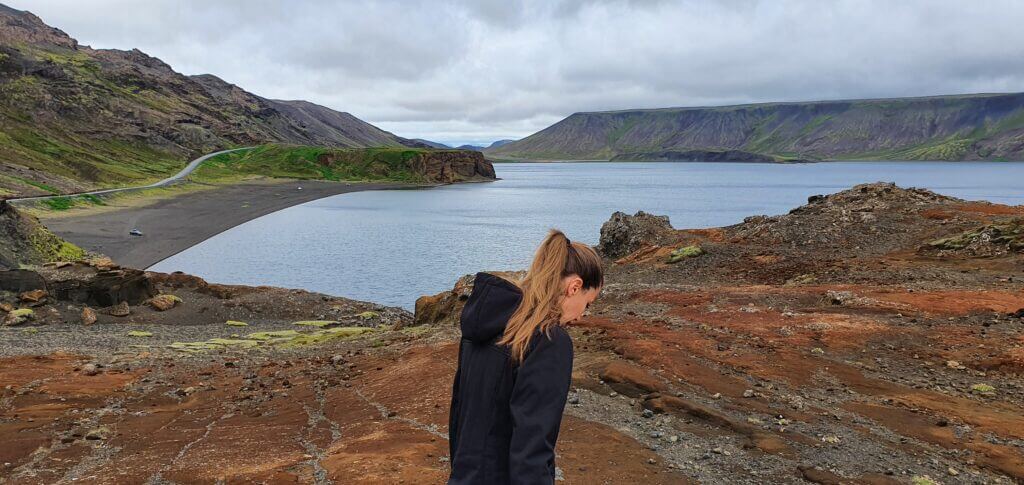
Kleifarvatn lake near the Seltún geothermal area on our way from Reykjavik towards Keflavik
Next, we had to pick up our 4×4 Lotus car rental from the airport and still had some additional 2 hours of spare time, so after a coffee break, we headed to our first Icelandic countryside experience – Kleifarvatn lake. The area around the lake is really nice and you may take some really nice pictures there in good weather. It’s a nice introduction to Icelandic landscapes but it’s not that stunning compared to other Icelandic highlights. The area is easily accessible by car with a few parking spots.
Seltún geothermal area
13:15-13:25
Distance from car park: 0 minutes Time spent at: 10-30 minutes Worth visiting even with bad weather: yes Physical condition needed: little Interesting index: 2 – great (1-amazing, 2-great, 3-nice)
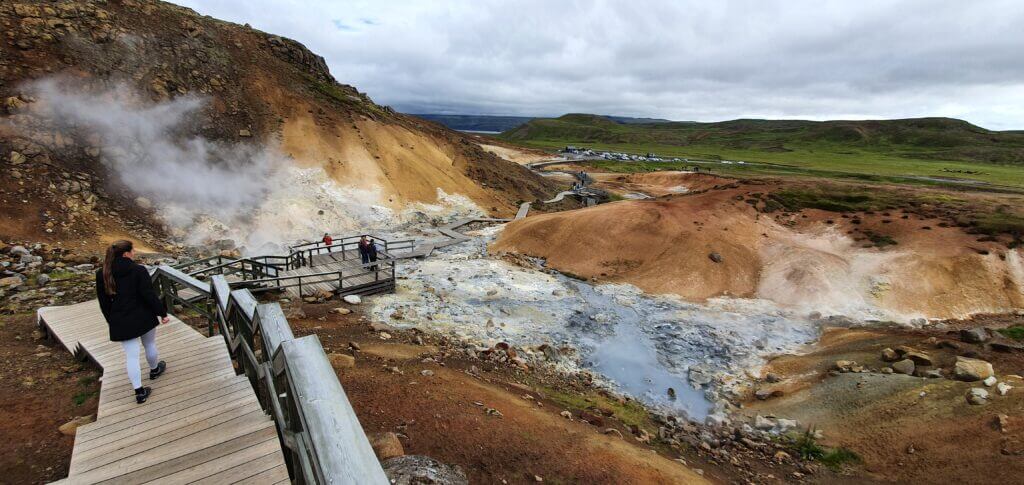
Seltún geothermal area on our way from Reykjavik towards Keflavik
Just next to Kleifarvatn lake lies a so-called Seltún area. Again it’s a very nice introduction to Icelandic geothermal activity, although it seemed a little touristy even in Covid times, probably because of its proximity to an airport and Reykjavik. It’s worth visiting though.
After Seltún we headed to Grundavik for a not very tasty lunch at the gas station and then to a car drop-off in Keflavik followed by pick-up of our Dacia Duster by Lotus car rental. We were very satisfied with the entire rental process (I would say Lotus was the best car rental in my life), hence I decided to write an article about it with a sincere positive review for Lotus.
Seljalandsfoss
18:20-19:00
Distance from car park: 5 minutes Time spent at: 20-60 minutes Worth visiting even with bad weather: yes, probably Physical condition needed: little Interesting index: 1 – amazing (1-amazing, 2-great, 3-nice)
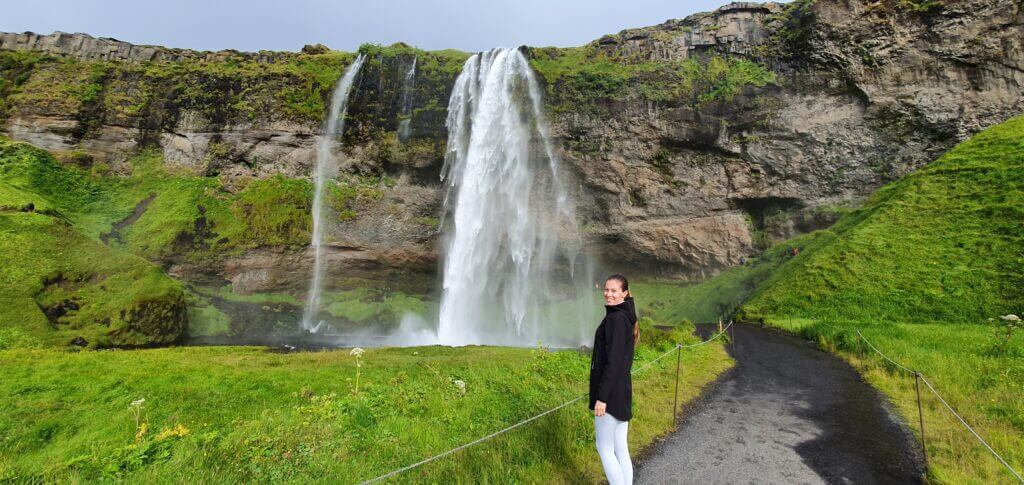
Seljalandsfoss at 7 pm
Our plan was to camp in Vik and we wanted to make a few important stops along the road. The first of them has been the famous Seljalandsfoss waterfall.
Parking
The car park in front of the waterfall is a paid one (7eur). Nobody had been checking the tickets at the time, however, we didn’t want to risk getting any infamously high Icelandic fines (e.g. 10 000 USD here) so we headed to the ticket machine. Over there my girlfriend realized that somebody had left their used parking ticket for someone else to use again, which seemed a really nice gesture, although I’m not sure whether this is, in reality, good or not (depends on, whether the area is being maintained using the fees collected from the parking or whether just someone is getting rich by renting a piece of ground for parking).
Waterfall
Anyway, Seljalandsfoss was amazing. We were lucky enough that the sky cleared just before our arrival and we could experience the waterfall playing with the sun and an accompanying rainbow. And yes, Seljalandsfoss is the waterfall you can walk behind, and yes it’s a beautiful experience. During Covid times, there were some 5-8 people around the waterfall area at the time of our visit, so we had the waterfall almost entirely to ourselves. We are not sure whether it’s because this was our first Icelandic waterfall or because of the really beautiful weather, but we feel like Seljalandsfoss was our favourite waterfall in entire Iceland.
Oh, and an important note – take a raincoat! It’s a waterfall so expect water splashing everywhere, especially if you are planning to walk behind it (which you should!).
Skógafoss
19:30-20:15
Distance from car park: 2 minutes (lower part), 7 minutes (upper part) Time spent at: 30-60 minutes Worth visiting even with bad weather: yes, probably Physical condition needed: little Interesting index: 1 – amazing (1-amazing, 2-great, 3-nice)
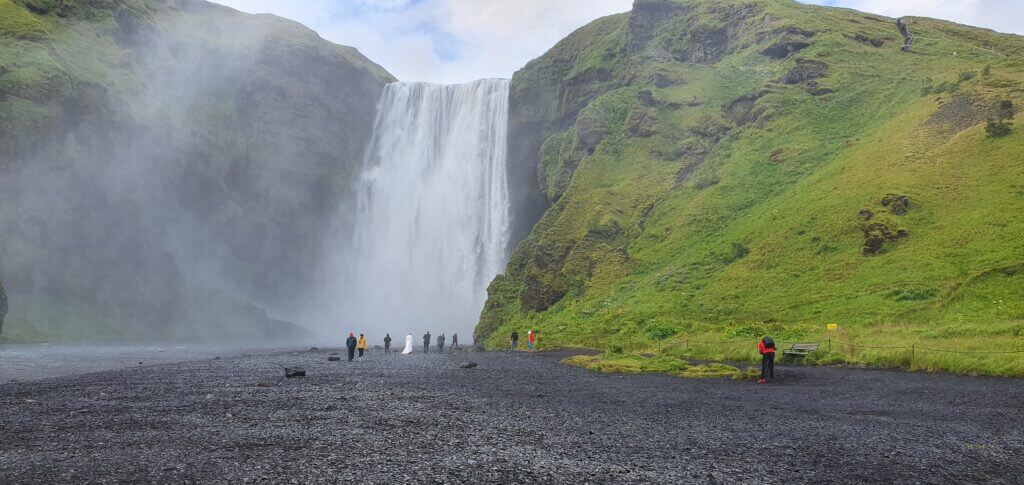
The bottom part of Skógafoss waterfall (and a wedding in the background ☺) at 8 pm
Our next stop was Skógafoss. The beautiful weather held on and the entire area around Skógafoss is just incredibly pretty. There’s a campsite just next to the waterfall so if you have a chance to camp in here, definitely go for it! The next time we visit Iceland I would definitely camp here. Waking up to the sound of bursting water and seeing the magnificent waterfall right after getting out of your tent must be an unforgettable experience.
With regards to the waterfall itself, you may walk literally into its bottom part. We were surprised that in most of the cases there were no barriers restraining you from going as close to the waterfall as you want. Which of course means, you have to take care of any danger for yourself.
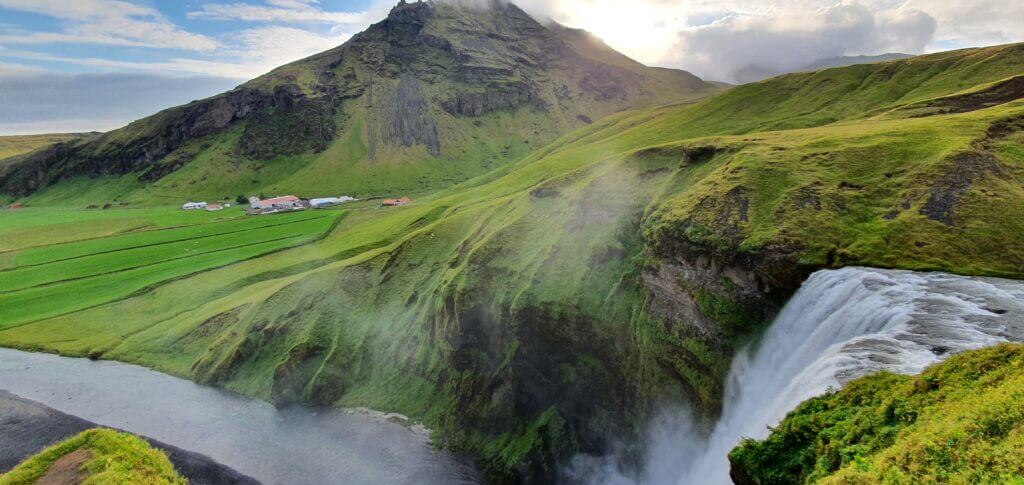
The upper part of Skógafoss at 8 pm in the evening
You may also climb a few stairs to get to the upper part of the waterfall, which we again definitely do recommend (especially in good weather) because you will be rewarded with a really nice view. Near the upper part, you will probably meet some sheep and you will see the path continuing more deeply into the national park. We didn’t go further as Skogafoss was supposed to be the highlight anyway.
Reynisfjara beach
21:00-21:15
Distance from car park: 2 minutes Time spent at: 15-40 minutes Worth visiting even with bad weather: yes, just beware dangerous waves Physical condition needed: little Interesting index: 1 – amazing (1-amazing, 2-great, 3-nice)
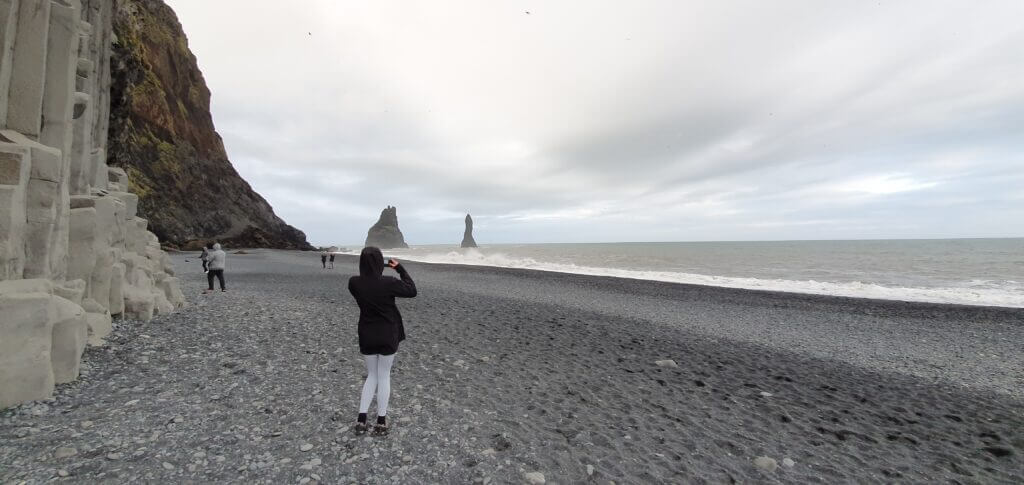
Reynisfjara beach at 9 pm in the evening
We arrived at our last stop just before 9 pm and again there were maybe 1-3 other cars other than us visiting the place. Reynisfjara was one of the most beautiful beaches we’ve seen around entire Iceland so it’s definitely worth a visit. All – the beach itself, the sea waves (which may be deadly, so keep a safe distance) and the nearby rock formations are stunning. Beware the strong wind, which we had a chance to experience, and I guess it may be even much stronger.
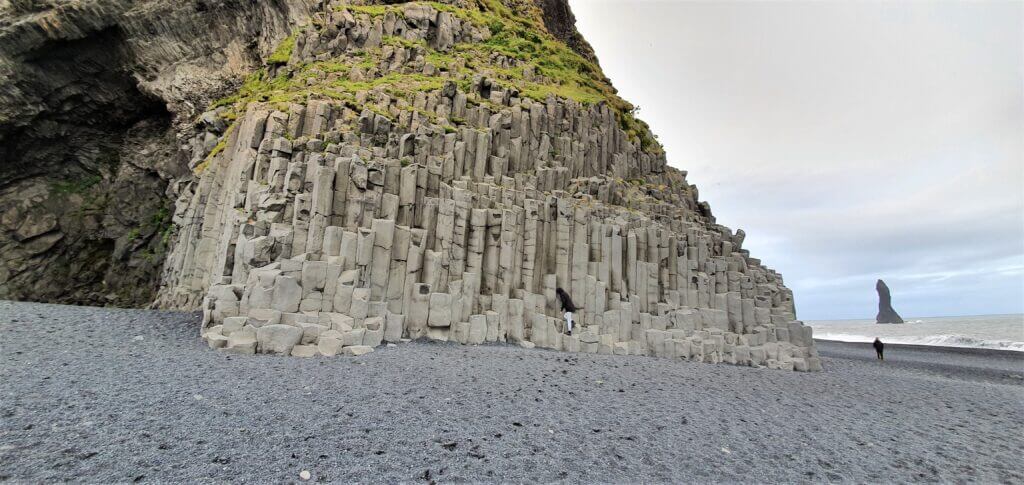
Basalt columns at Reynisfjara beach
Vik camping
21:40-
We arrived at the Vik camping quite late, after 9 pm and it turned out we literally arrived at the last minute. The camp manager told us the camp is full and they cannot allow any additional visitors to camp, because of the new Covid restrictions imposed by the government just a few days ago. After a short begging-talk, the manager told us we are the last car to be let in. Luckily. The campsite is really nice and so are the surroundings of the small Vik village. It’s useful to keep some 1000-2000 worth of Icelandic krona coins, because showers are the only thing in Iceland that cannot be bought by your credit card, and they do cost some 200-400 ISK.
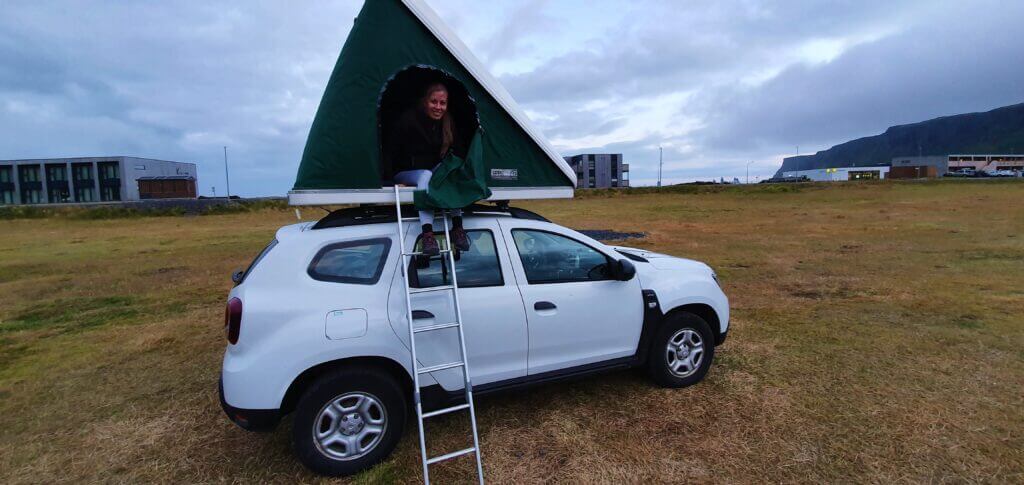
Going to sleep in a rooftop tent in Vik campsite
After we had paid for the camp (10eur/person is a universal price for camping in Iceland) the manager closed the registration office and stuck a note on the door saying “campsite is full, no more guests allowed”. Since the campsite has no gate or ramp, more campers kept coming into the camp and seemed not to be bothered by a manager’s note found on the doors. Well, this is how a mess around Covid looked like in Iceland sometimes. We had seen the next day in the morning that the late-comers at least had to pay for the camping.
Skipped places
- Gljúfrabúi waterfall
- Solheimasandur plane wreck
- Dyrhólaey
- Further exploration of the area around Reynisfjara/Dyrhólaey
Since our day was already packed enough with stops, we decided to skip the above-mentioned sights. Gljúfrabúi waterfall mainly because Seljalandsfoss and Skógafoss were supposed to be more stunning. Solheimasandur plane wreck didn’t seem worth time walking for us and it turned out we were able to see another plane wreck just by accident later on during our trip in Iceland. Dyrhólaey cliffs seemed to be a nice stop for a visit, but we’ve already seen similar cliffs in other countries and we planned to see a supposed-to-be-more-beautiful Látrabjarg cliff later on. Hence, we do not regret skipping any of these.
